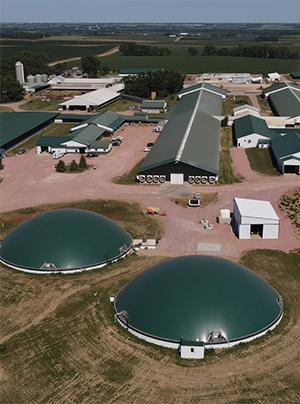
Adopting anaerobic digester technology for a dairy farm requires teamwork, time, and patience. Your farm will need dependable partners to help navigate this sometimes-challenging landscape.
To assemble your network, talk with peers, visit farms with existing systems, and ask for referrals.
Every build is different, but your current advisors all play important roles in how your dairy proceeds, as do potential partners who are not yet part of your team. A well-rounded digester team includes:
- Agronomists. Reach out to agronomists to plan for and utilize manure resources. Their role is important as you work through manure application logistics.
- Farm attorney. Consult with your farm’s attorney early in a digester development process to ensure your legal rights are protected and the responsibilities of involved parties are spelled out.
- Irrigation specialists. Consider visiting with an irrigation specialist if you will be applying manure effluent via an irrigation system. These specialists may not be part of initial decisions but consider bringing this advice on board when you work through application logistics.
- Lenders. Financial professionals should already have a seat on your team. Be sure to share plans with them early in the development process.
- Local and state government officials. Know local, county, and state siting regulations. Begin with township zoning boards to determine which governing bodies have jurisdiction over a project before you begin.
- Manure management system specialists. Involve these experts early in the process to help understand and optimize manure volume, storage, and transport throughout your farm’s facilities.
- Natural Resources Conservation Service personnel. NRCS can be a source of digester funding as well as provide federal regulatory guidance and practice standards for dairy farms. It’s important to involve NRCS personnel early in the digester project. discussions.
- State departments of ag and natural resources personnel. Local officials, experienced digester and manure management personnel, and NRCS experts should be able to help determine if and when state department of agriculture and/or natural resources officials must be part of your project team.
If you don’t know who some of these key people are in your community, use the nearby links to help track down the individuals and departments you must work with to get, and keep, your project rolling.
The key to success with this system, or any other project, is to collaborate with your partners to design the best system to fit your needs and help accomplish your farm’s goals.
Learn more about choosing a manure solutions partner.
Sidebar:
Here are a few government, ag industry, and biogas resources to help in your anaerobic digester journey:
- AgStar biogas project development handbook
- AgStar guidelines and permitting for livestock anaerobic digesters
- Anaerobic Digestion Research and Education Center
- Certified crop advisor directory
- Farmer’s Guide to Dairy-Derived Biogas Production, Treatment and Utilization
- Irrigation Association
- Key components of successful manure supply agreements
- NRCS conservation practice standards for anaerobic digesters
- NRCS state offices
- State and local governments
- State departments of agriculture
- USDA rural development state offices
- U.S. Environmental Protection Agency anaerobic digestion for dairy farms
- Wisconsin biogas survey report



